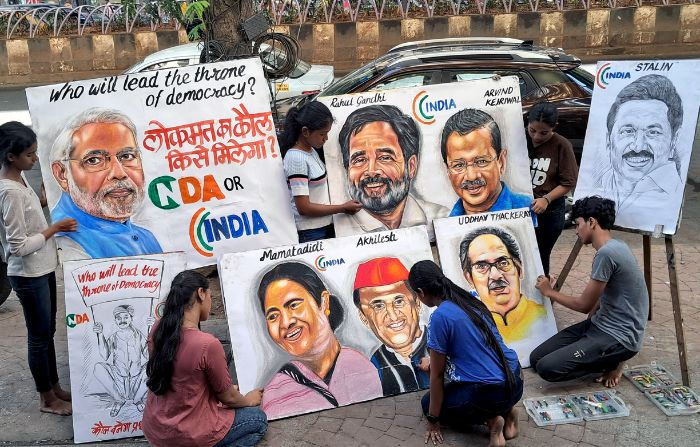- Friday, April 04, 2025
While the Indian PM is eyeing his third consecutive victory in general elections after 2014 and 2019, the opposition INDIA bloc led by the Congress Party is also hoping for a rebound.

By: Shubham Ghosh
INDIAN prime minister Narendra Modi would eye for a record-equalling third straight term in office as results of the just concluded general elections in India will be announced on Tuesday (4).
Only Jawaharlal Nehru, the country’s first prime minister, had won three consecutive victories between 1952 and 1962 but passed away before concluding his third term.
However, while most experts have long seen the National Democratic Alliance (NDA) led by Modi’s Bharatiya Janata Party (BJP) as the favourite in the polls, a lot is at stake for the ruling combine in terms of the scale of victory it can pull off and new territories it can conquer.
Exit polls have been unanimous in their prediction that the NDA is closer to realising Modi’s ambitious target of “400 paar” (beyond 400 seats) for his alliance than the opposition Indian National Developmental Inclusive Alliance (INDIA) bloc is to crossing even the 180 mark, one-third of the total number of seats (543).
Read: Most exit polls predict big win for PM Modi
The INDIA bloc, comprising more than two dozen parties that aim to stop Modi from winning power again, is hoping to spring a surprise and is not convinced by the exit poll findings. The stakes are higher for the opposition that includes the Indian National Congress which has been defeated by Modi’s BJP in most elections — whether national or local — since 2014 when Modi first became the PM.
The election results will show if the Congress has it in its organisation and leadership to challenge the BJP amid its reducing footprint across the country since 2014.
It has failed to get even the main opposition party status in two consecutive general polls (2014 and 2019) and has been reduced to a pale shadow of itself in a number of states, especially in India’s Hindi heartland.
Read: Two days before election results, top Modi opponent returns to jail
Its leaders, including president Mallikarjun Kharge and principal campaigner Rahul Gandhi, have claimed that their alliance will get 295 seats in the 543-member Lok Sabha, marking an end of the Modi era.
Electoral verdicts have historically been accepted, even though grudgingly, by all parties in Indian elections, there has been a sharper edge to the questions being raised by opposition parties this time over the polling process, including the Election Commission of India (ECI).
In the run-up to the counting, the campaign acrimony between the two battling camps has spilled over into the post-poll trading of accusations after the exit polls predicted a massive win for the incumbent alliance, a forecast summarily dismissed by Congress leader Rahul Gandhi as “Modi media poll”.
INDIA bloc leaders, who have been raising doubts over the electronic voting machines, have accused the prime minister of sending a signal to the bureaucracy through these “fantasy” exit polls and marched to the ECI, urging the poll watchdog to follow the counting guidelines.
In its counter-attack, the BJP has accused its rivals of trying to undermine the integrity of India’s electoral process and asked the EC to prevent any attempt of “violence and unrest” during the counting of votes. Modi framed the BJP’s campaign around the opposition’s “appeasement politics”, accusing the Congress and its allies of handing over a chunk of the reservation meant for the Other Backward Classes (OBC) to Muslims and allegedly eying people’s family assets to further its “redistribution of wealth” agenda.
The issues of national and cultural pride, the government’s welfare schemes and the overall political stability and economic growth also figured prominently in the speeches of BJP leaders, even though they were accused by the opposition of running a divisive and communal campaign to polarise votes. The EC has dismissed the opposition’s attack on its conduct of polls, with chief election commissioner Rajiv Kumar daring it on Monday (3) to share evidence of attempts to influence the polling process.
Local polls were held in the eastern state of Odisha alongside the national election and the BJP and the Biju Janata Dal, which has been in power in the state since 2000 under chief minister Naveen Patnaik’s leadership, are locked in a fierce battle for power. Assembly polls were also held simultaneously in the YSR Congress Party-ruled southern state of Andhra Pradesh.
Another issue that has drawn the limelight is whether the BJP will be able to emerge as a strong force in Tamil Nadu and the Left-ruled Kerala, two states where it has currently no seats but is predicted to win a few this time. A poor show by the Left will further darken its prospects nationwide as Kerala is the only state where it remains a strong force after being knocked off reckoning in its former strongholds of West Bengal and Tripura.
The results are also expected to spell out the people’s verdict on the fate of regional stalwarts like Sharad Pawar and Uddhav Thackeray, whose parties have joined hands with the BJP and who have run an intense campaign to win over people’s support for their factions.
The verdict will also be out on a number of top federal ministers, including Piyush Goyal, Bhupender Yadav, Sarbananda Sonowal and Dharmendra Pradhan, all members of the non-elected Upper House of the parliament asked by the BJP to contest the polls, and former chief ministers, such as the BJP’s Shivraj Singh Chouhan, Basavaraj Bommai, Trivendra Singh Rawat and the Congress’s Digvijay Singh and Bhupesh Baghel.
Besides Modi, who contested the election from Varanasi for a third straight term, senior members of his cabinet, such as Amit Shah and Rajnath Singh, are in the fray, and the margins of their win will be watched out for as well.
(With PTI inputs)